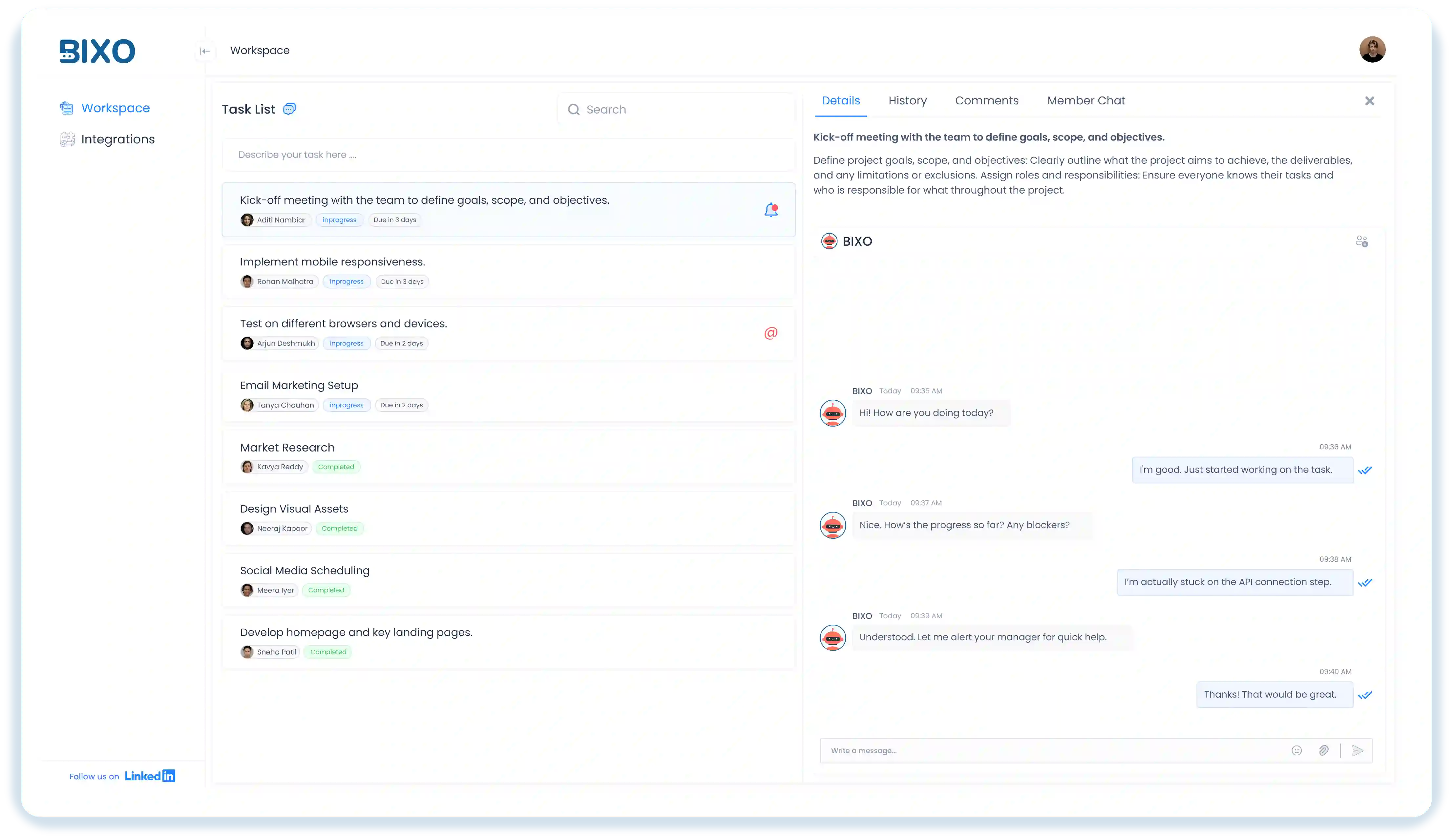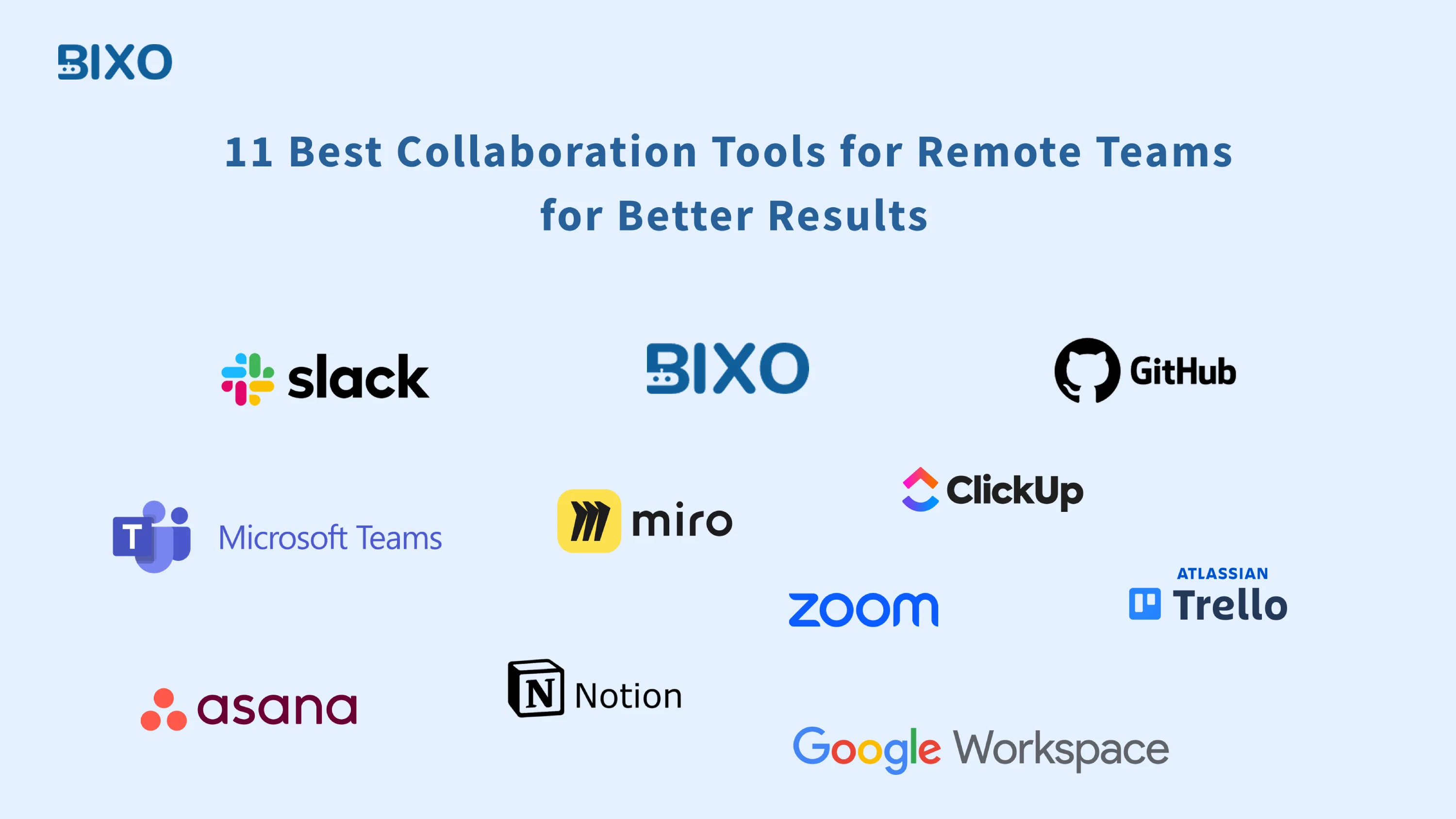
Table of Content
Focus on what matters. BIXO handles the rest!

Managing a team is not just about assigning tasks, but about making sure the work is shared fairly. You may see that everybody looks busy, but the actual progress is slow. That’s often a sign the work isn’t evenly distributed. When some of your team members are overloaded while others have too little to do, it creates stress, delays, and even hurts trust over time.
In this guide, you’ll learn how to manage workload in a way that feels fair and simple. You’ll see how to divide tasks better, use the right tools, and follow easy strategies that keep your team motivated, focused, and doing their best without burning out.
What Is Workload Management?
Workload management refers to the process of planning, allocating and tracking work to achieve a reasonable and effective distribution of work between your team members. It allows managers to schedule and monitor the work progress, avoid burnout of employees, and enhance team productivity.
Effective workload management assists you in providing a balanced environment where everyone is aware of what to do and when. It keeps work fair for everyone, so no one feels overloaded and no one feels left out. Having clear and manageable tasks helps managers to increase the morale of teams, improve their concentration, and ensure the smooth execution of projects.
Why Is Workload Management Important?
Good workload management brings order to everyday tasks. It keeps your team focused, avoids extra stress and keeps work moving smoothly.
These are some of the main benefits of workload management:

- Prevents Burnout: When work is shared fairly, no one feels overwhelmed. This will keep your team healthy and motivated to give their best without feeling burned out.
- Boosts Productivity Effective project planning eliminates confusion about what needs to be done and when. This eliminates time wastage, confusion, and boosts productivity.
- Improves Team Morale Fair workload leads to a feeling of equity and confidence. When everyone is contributing equally, team spirit naturally goes up.
- Reduces Missed Deadlines With a clear plan and proper tracking, your team can stay on top of tasks and track project deadlines without the last-minute rush or stress.
- Increases Accountability Workload management makes it clear who’s responsible for what. This motivates team members to be accountable and complete their tasks.
What Are the Constants of Workload Management?
When you are handling projects, some aspects of workload management never change. These constants act like a guide, helping you to balance tasks, people, and deadlines. By focusing on these constants, you can implement smarter workload management strategies. This makes managing workload easier and less stressful for your team.

Deliverables
Deliverables are the results your team must complete, like reports, features, or client tasks. Clear deliverables keep your team focused and make team workload management easier. Without these deliverables, managing workload becomes confusing and stressful. With these clear deliverables, your team knows exactly what to achieve.
Dedicated Teams
Dedicated teams mean giving the right tasks to the right people based on their skills and capacity. This keeps your workload fair and balanced. With the help of workload management tools, you can see who has time, and you can assign work wisely for your team. For example, a dashboard showing the team availability makes the process simple and clear for assigning the work to the team members.
Deadlines
Deadlines show your team when tasks need to be completed. In workload management, realistic deadlines prevent burnout and keep projects on track. If deadlines are too short, your team feels stressed. If they are too long, tasks lose their importance. Finding the right balance helps your team to work smoothly.
Example
Let’s take a simple example. Your team is working on launching a new app. The main deliverables are the app, a short promo video, and a user guide. These are the things that need to be finished before the launch.
You have different teams taking care of each part. Developers are busy building the app, the marketing team is working on the promo video, and the support team is writing the user guide. Everyone knows their role and what they need to do.
To keep things running smoothly, the manager sets deadlines like finishing the app by the 15th, the video by the 18th, and the guide by the 20th. These deadlines help everyone stay on track and avoid a last-minute rush.
The Five-Step Guide to Managing Team Workload Effectively
Managing workload becomes easier when you follow a simple process. With the right steps, you can keep the tasks balanced, reduce stress, and support better teamwork. These steps are part of smart workload management strategies that help you guide projects smoothly. By applying these steps, you can make team workload management smooth and successful.

Know What Your Team Can Handle
Before assigning tasks, understand how much work each team member can complete. This avoids overloading and makes workload distribution fair. By knowing the skills and capacity of your team, you can practice better workload management and keep projects moving forward without any stress.
Establish Clear Communication
An important key to effective workload management is communication. Explaining what is to be done, providing regular updates, and having a clear vision of the goals can help each team member understand what is important. This will help your team’s workload management process run more smoothly and eliminate misunderstandings. Clear communication helps your team to achieve tasks without any confusion and stress.
Don’t Give Too Much Work at Once
When you assign too many tasks at the same time, the workload can feel too heavy to achieve. By breaking down work into manageable tasks, you can make the progress feel easier and more motivating. This approach is one of the best workload management strategies to prevent burnout and improve focus to complete the task.
Use Templates to Save Time
Templates help your team complete repetitive tasks faster. Instead of starting from scratch every time, a ready-to-use format template keeps the work easy to understand. Using templates is a smart workload management example that reduces effort and makes team workload management smoother.
Check In Regularly with Your Team
Regular check-ins will help you to check how much workload has already been completed and what still needs attention. You can support and motivate your team by checking regularly and reviewing the progress. These check-ins are easier and more effective in completing the workload with the help of workload management tools.
Common Challenges in Workload Management
No matter how good your team is, managing workload can still feel tricky. New tasks keep coming in, priorities shift all the time, and it’s easy for your team to feel overloaded.
These are some of the actual issues that most teams struggle with:

Uneven Distribution of Tasks
Workload is not always distributed fairly among team members. Some end up handling multiple responsibilities while others have little to do. This imbalance causes stress, slows down progress, and lowers overall team morale.
Unclear Priorities
When everything seems equally important, teams struggle to decide what comes first. Without a clear focus, effort gets scattered across tasks that may not add real value. As a result, productivity drops and deadlines get missed.
Poor Time Estimation
It’s common to underestimate how long a task will take. What seems like a quick job can stretch for hours, throwing off schedules and delaying other work. Consistent time tracking helps teams plan better and stay realistic about workloads.
Lack of Visibility
Without a clear view of who is doing what, progress becomes difficult to monitor. Managers may miss potential bottlenecks or delays, leading to poor coordination. Visibility ensures team accountability and keeps everyone aligned with project goals.
Communication Gaps
When communication isn’t consistent, important updates get lost and misunderstandings arise. This often leads to duplicate work, missed deadlines, and frustration within the team. Open and regular communication helps maintain clarity and smooth collaboration.
The good news? These challenges are totally normal and with a little awareness (and the right tools), they’re also fixable.
Practical Tips to Manage Workload Effectively
These are some simple and useful tips to ensure that the workload can be balanced and stress-free in your team:

Use simple methods like Scrum or Kanban
Frameworks like Scrum and Kanban help teams break down large projects into manageable tasks. They make it easier to track progress, adjust task priorities, and maintain a steady workflow. This structure keeps everyone focused and adaptable to changes.
Pick the right tools to stay organised
Using the right tools can make a huge difference in team coordination. Platforms like BIXO give managers visibility into who is working on what, reducing confusion and missed deadlines. Organised tools keep your team aligned and projects running smoothly.
Automate the boring stuff
Repetitive tasks like reminders, follow-ups, or status checks can drain valuable time. Automating these routine activities keeps the team focused on important work instead of manual updates. It also ensures that nothing slips through the cracks.
Always leave some breathing room
Avoid scheduling every minute of your team’s day. Leaving a little buffer time allows space for unexpected delays or urgent tasks without causing burnout. A flexible schedule helps maintain focus, balance, and overall productivity.
How BIXO Makes Workload Management Easier
Imagine it’s Monday morning and you’re juggling three projects while deadlines are slipping because the team isn’t clear on who’s doing what. That’s when BIXO steps in and instantly makes things easier. You can see who’s busy, who’s available, and where work is stuck, all in one place. No more endless messages or constant follow-ups. Assigning tasks, adjusting workloads, and changing plans becomes simple, and everyone knows exactly what to do. BIXO handles the follow-ups, so your team can focus, and you can breathe a little easier.

Conclusion
Managing a team’s workload works best when everyone feels supported and the work is shared fairly. When people know what they need to do and tasks are clear, it’s easier to get things done without stress. Frequent check-ins and steady support help your team stay motivated, confident, and engaged throughout the work process. Using tools like BIXO can make keeping track of work much easier. In the end, when the workload feels fair, the team is happier, more productive, and ready to give their best every day.
FAQs
Some signs include frequent delays, missed deadlines, team burnout, or others having too little to do. Frequent meetings and a visual board will make it easier to identify unequal workloads sooner.
Start small. Start with just one project and demonstrate to your team how using the tool can save time, and get feedback. Keep it simple and show them how it helps their daily work.
Yes, absolutely. In remote or hybrid teams, it is even more essential that the tasks are well divided and communicated. With tools such as BIXO to manage work, it is simple to ensure everyone is on the same page, no matter where they are.
It’s much easier to plan work when you know exactly who’s doing what. Having simple tools that help you organise and make changes fast can really take the pressure off.





